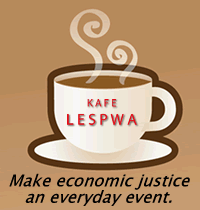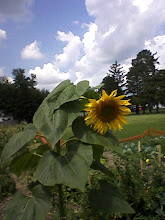 Remember those Christian hippie chicks back in the 1980s?
Remember those Christian hippie chicks back in the 1980s?I can almost visualize a booth at an Earth Day festival or some peace rally: There would be a young woman peddling beads and trinkets from across the world. She'd be wearing fair trade buttons and have an array of pamphlets documenting the importance of fairly traded goods and the injustice of the current system. She was insistent and passionate about the cause.
I first remember learning about Fair Trade products at those peace & justice events in the 1980s, as I was coming of age. I was immediately sympathetic to the cause. However, I must also admit that I was almost embarrassed by those efforts. These were the Reagan-Bush years, when social justice was a terribly unpopular thing. Considering the unbelievable size of the world's markets, what would a few fairly traded beads, crafts and soap do? It was such a minuscule amount, the tiniest fraction of a drop in the bucket.
This feeling of futility has always hung like a shadow anytime I would think about social justice activities, including vigils against the death penalty, civil disobedience to close the School of the Americas or any number of other important causes. In college, I became involved in direct service to the hungry and homeless, and the immediate benefits to all involved were captivating. I put my attention there.
Fast forward to today: Our Catholic Worker community has been looking into ways of serving the Haitian people. The sheer devastation of the recent earthquakes have made it impossible not to take action, as we've all been in agony over the issues it raises. It seems every church and community group has been active in this cause, and much assistance has been raised for emergency efforts. In light of that, we've been looking at options to support long-term, sustainable development in Haiti--the kind of development that might have prevented a lot of those earthquake deaths.
Pat reminded me of the group Just Haiti, who were selling fairly traded coffee at the recent Pax Christi gathering in Chicago. He bought a package and brewed it this past summer, and it was good. Ideas started circulating about distributing this coffee locally--perhaps we could be a vendor of some kind.
I started researching the local market by visiting numerous churches and shops like Global Gallery and the Clintonville Community Market. I was amazed at the well-established infrastructure that churches already have with fair trade vendors. One church with 600 members moves 50 lbs of coffee each month! These efforts are strong across denominational lines, as I visited Unitarian, Methodist, Mennonite and Catholic churches and I saw the same wonderful activity.
 It is hard to get accurate statistics on the market share of fairly traded coffee. Much depends on how the terms are defined and who regulates and certifies it. Just to get a broad sketch, though, one report shows the market share of fair trade coffee in the US to be about 0.2% in the year 2000, growing to 1.8% by the year 2004. By anyone's calculation, that is a significant rate of growth in such a short time! This other report picks up where the other leaves off and show the market share rising to 3.1% by the year 2006. Now, national supermarket and coffee shop chains have begun selling fair trade, as well.
It is hard to get accurate statistics on the market share of fairly traded coffee. Much depends on how the terms are defined and who regulates and certifies it. Just to get a broad sketch, though, one report shows the market share of fair trade coffee in the US to be about 0.2% in the year 2000, growing to 1.8% by the year 2004. By anyone's calculation, that is a significant rate of growth in such a short time! This other report picks up where the other leaves off and show the market share rising to 3.1% by the year 2006. Now, national supermarket and coffee shop chains have begun selling fair trade, as well.I had to admit: Those Christian hippies in the 1980s changed the world!
When virtually no one else was talking about it, when it was almost laughable, those brave folks, in the thickest point of the Rush Limbaugh years, setting up those fair trade tables 20 years ago started a new conversation. They first convinced the churches, who have since been educating their congregations. People kept talking about it, urging their churches, local shops and big chains to take on fair trade products. Those buttons started a groundswell and created pressure so that today fair trade is a significant--and still growing--market force.
I'm reminded of the famous Margaret Meade quote: Never doubt that a small group of thoughtful, committed citizens can change the world; indeed, it's the only thing that ever has.
We have heard it before and know it to be true. Still, it is hard to believe it when we feel like such a small David versus such a large Goliath. Like many others out there, I have been sympathetic to social justice causes by paralyzed by the sense of futility. In researching fair trade coffee, I came face to face with the reality that IT WORKS! A few people brave enough (or perhaps silly enough) to pick up a sign and talk the truth about injustice really can and do make a difference.
Those fair trade tables remind me how much we should never discount our efforts for justice, no matter how small they may seem at the time. Dorothy Day talked about how monks offering hospitality in the so-called Dark Ages had a lasting impact on society--they changed society without violent revolution or total acquiescence to negative circumstances.
Back to the coffee: I could not find anyone else in Columbus distributing coffee from Haiti, so there is room to grow for sure. The good and bad news of the market in Columbus is that it is so well-established. Asking churches and co-ops to temporarily halt their orders in order to try out Haitian coffee seems counterproductive. It can be argued that the circumstances in Haiti can demand such an action, but those Peruvian, Salvadoran and Ethiopian farmers have also come to depend on our market and to break relationship with them in order to help Haiti is a tough item to discern. It might be best to break new ground in the market.
We'll keep you posted on how this develops, and please don't hesitate to share ideas with us if you see a direction this could go. Perhaps the next time you visit the Columbus Catholic Worker, you may see a table of fair trade beads, buttons, coffee and chocolate on display.





No comments:
Post a Comment